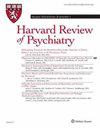Why Don't You Take This to a Friend? A Question Psychotherapists Should Ask More Often.
IF 3.4
4区 医学
Q2 PSYCHIATRY
引用次数: 0
Abstract
Since 1996, we have been studying loneliness and the decrease in the average number of confidants that most people have. We are gratified that the topic of loneliness is now less taboo, thanks in large part to press coverage during the pandemic about how difficult the isolation was for everyone. But we have also noticed how much Americans rely on their therapists to help themwith their most intimate conundrums. We could not be more grateful to our patients who have entrusted us with their confidences over many years. But we also worry: have we contributed to a fraying of the social fabric by implying that confidences about the usual human conundrums are better saved for the ears of a therapist than shared with a close friend? Too many Americans are lonely “frequently” or “almost all the time or all the time” 36% in a recent study, including 61% of young people aged 18–25 and 51% of mothers of young children.We hear from our patients that it is often a friend who says the equivalent of “This is too much for me to handle; maybe you should see a therapist.” And despair and suicidal depression increase while our nation turns increasingly to the mental health profession rather than friends and relatives to help them with life’s knotty problems. We have noted in our previous work on social isolation that the culture of most Americans includes a deep distaste for depending on others, and an over-valuing of independence and “having things one’s own way.” Even college students have the notion that only after successfully living alone and learning to enjoy their own company will they be well suited for a love relationship with someone else. Yet many of them get snagged by depression along this journey.你为什么不把这个告诉你的朋友呢?心理治疗师应该经常问的问题。
本文章由计算机程序翻译,如有差异,请以英文原文为准。
求助全文
约1分钟内获得全文
求助全文
来源期刊

Harvard Review of Psychiatry
PSYCHIATRY-
CiteScore
7.50
自引率
0.00%
发文量
67
审稿时长
>12 weeks
期刊介绍:
The Harvard Review of Psychiatry is the authoritative source for scholarly reviews and perspectives on important topics in psychiatry. Founded by the Harvard Medical School''s Department of Psychiatry, the Harvard Review of Psychiatry features review papers that summarize and synthesize the key literature in a scholarly and clinically relevant manner. Topics covered include: Schizophrenia and related disorders; Mood disorders; Personality disorders; Substance use disorders; Anxiety; Neuroscience; Psychosocial aspects of psychiatry; Ethics; Psychiatric education; and much more.
In addition, a Clinical Challenges section presents a case with discussion from a panel of experts. Brief reviews are presented in topic-specific columns that include Cross-Cultural Psychiatry, History of Psychiatry, Ethics, and others.
 求助内容:
求助内容: 应助结果提醒方式:
应助结果提醒方式:


